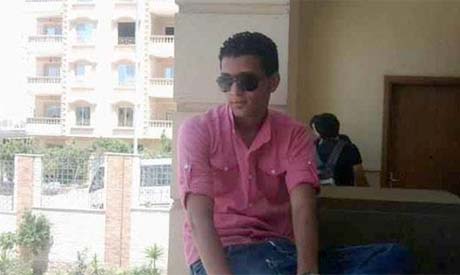 Twenty-year-old engineering student Ahmed Said was stabbed to death on Sunday in the Egyptian canal city of Suez – allegedly by bearded men – while walking with his fiancée.
Twenty-year-old engineering student Ahmed Said was stabbed to death on Sunday in the Egyptian canal city of Suez – allegedly by bearded men – while walking with his fiancée.
According to eyewitnesses, Said was attacked by three men with long beards and dressed in galabiyas – attire generally associated with religious Muslims – while walking with his fiancée near the centrally-located Arbeen Square.
"They shouted at him, demanding to know his relationship with the woman he was with," Said's father said in video testimony currently circulating on social-media networks. "And Said replied that it was none of their business."
Provoked by Said's reaction, one of the men then reportedly stabbed him between his legs. The young man was then taken to Suez Hospital for treatment before being transferred to a hospital in nearby Ismailiya where he eventually succumbed to his injuries.
The victim's brother told Ahram Online that it was not the first time for such an incident to occur in Suez.
"Another man was attacked earlier for refusing to divulge details of his relationship with the woman he was with, who turned out to be his wife," he said.
In last year's parliamentary polls, the ultra-conservative Salafist Nour Party won the largest number of votes in Suez.
The head of the Muslim Brotherhood’s administrative office, for his part, condemned the act, referring to the culprits as "outlaws" and calling for a thorough investigation of the incident.
Liberal and leftists forces, meanwhile, including the Egyptian Social Democratic Party, the Nasserist Party,the Wafd Party,the Tagammu Party, the April 6 Youth Movement, the National Association for Change and Mohamed ElBardei's former presidential campaign, issued a joint statement on Tuesday morning to express solidarity with the victim and urge security officials to investigate.
With the post-revolution rise of political Islam, concerns have mounted among some quarters of the public about the future of personal freedoms in Egypt.
In March of last year, Islamists forces succeeded in transforming the fight for Egypt’s post-revolution constitution into a fight between Islam and secularism, calling on voters to approve a Constitutional Declaration (issued by the ruling military council in the wake of last year's revolution) preserving Article 2 of the Egyptian Constitution that makes Islamic Law "the principal source of legislation."
Islamist parties achieved more power late last year in Egypt's (now-dissolved) parliament when the Muslim Brotherhood's Freedom and Justice Party and the Salafist Nour Party together won some 70 per cent of the seats in the People's Assembly (the lower house of Egypt's parliament) in Egypt's first democratically-held legislative elections.
Last December, a Facebook page appeared – claiming to be associated with the Nour Party – calling for Islamist 'moral police' to patrol the streets of Egypt and enforce strict Islamic behaviour. The Nour Party, for its part, has consistently denied any connection with the Facebook page, the precise origins of which remain unknown until now.
Yet despite its uncertain origin, the campaign succeeded in sowing panic among certain circles, even though little change was seen on the streets.
After Brotherhood candidate Mohamed Morsi defeated Ahmed Shafiq – ousted president Hosni Mubarak’s last prime minister and self-proclaimed champion of the 'civil state' – in last month's free presidential polls, reports increased of women being harassed in the streets for not abiding by Islamic dress codes.
Official Islamist parties, meanwhile, condemn the incidents.
On 28 June, Muslim Brotherhood spokesperson Mahmoud Ghozlan asserted that the group was the victim of an "orchestrated smear campaign," in which acts of violence against women by unknown assailants were being falsely attributed to the Brotherhood and its Islamist allies.



